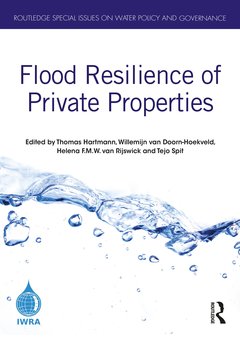Flood Resilience of Private Properties Routledge Special Issues on Water Policy and Governance Series
Coordonnateurs : Hartmann Thomas, van Doorn-Hoekveld Willemijn, F.M.W. van Rijswick Helena, Spit Tejo

Flood Resilience of Private Propertiesexamines the division and balance of responsibilities between the public and the private when discussing flood resilience of private properties.
Flooding is an expensive climate-related disaster and a threat to urban life. Continuing development in flood-prone zones compound the risks. Protecting all properties to the same standards is ever more challenging. Research has focused on improved planning and adapting publicly-owned infrastructure such as streets, evacuation routes, and retention ponds. However, damages often happen on private land. To realize a flood-resilient city, owners of privately-owned residential houses also need to act. Measures such as mobile barriers and backwater valves or avoiding vulnerable uses in basements can make homes more flood-resilient. But private owners may be unaware of flooding risks or may lack the means and knowledge to act. Incentives may be insufficient, while fragmented or unclear property rights and responsibilities entrench inertia. The challenge is motivating homeowners to take steps. Political and societal systems influence the action citizens are prepared to take and what they expect their governments to do. The responsibility for implementing such measures is shared between the public and the private domain in different degrees in different countries.
This bookwill be of great interest to scholars of water law, property rights, flood risk management and climate adaptation. This book was originally published as a special issue of Water International.
Introduction: Increasing flood risk asks for new approaches 1. The levee effect along the Jamuna River in Bangladesh 2. Managing flood risk in shrinking cities: dilemmas for urban development from the Central European perspective 3. The effects of tailor-made flood risk advice for homeowners in Flanders, Belgium 4. More than a one-size-fits-all approach – tailoring flood risk communication to plural residents’ perspectives 5. Deconstructing the legal framework for flood protection in Austria: individual and state responsibilities from a planning perspective 6. Too much water, not enough water: planning and property rights considerations for linking flood management and groundwater recharge 7. Dealing with distributional effects of flood risk management in China. Compensation mechanisms in flood retention areas 8. Sticks and carrots for reducing property-level risks from floods: an EU–US comparative perspective
Thomas Hartmann is Associate Professor at Wageningen University, the Netherlands, and he teaches at J.E.P. University Ústí and Laben, Czechia, and Bonn University, Germany. He combines an engineering perspective with socio-political approaches to flood risk management and land policies and has published numerous papers, books and special issues on these topics.
Willemijn van Doorn-Hoekveld is Assistant Professor at the Utrecht Centre for Water, Oceans and Sustainability Law, Utrecht University, the Netherlands. She does research in public law, water law and liability law, where she focuses on flood resilience and recovery.
Helena F.M.W. van Rijswick is Full Professor of European and Dutch Water Law and director of the Centre for Water, Oceans and Sustainability Law at Utrecht University, the Netherlands. She focuses on water law within the broader field of environmental, spatial planning and nature conservation law from a European, constitutional, and administrative legal and interdisciplinary perspective.
Tejo Spit is Full Professor in Urban and Regional Planning at Utrecht University, the Netherlands. He specializes in land policy, planning methodology, infrastructure planning and administrative aspects of spatial planning.
Date de parution : 09-2023
17.4x24.6 cm
Date de parution : 11-2020
17.4x24.6 cm
Disponible chez l'éditeur (délai d'approvisionnement : 14 jours).
Prix indicatif 160,25 €
Ajouter au panierThèmes de Flood Resilience of Private Properties :
Mots-clés :
Flood Risk Management; Flood Risk; Flood Insurance; Water law; EU Flood Directive; Private properties flood resilience; Flood Protection Measures; Flood Resilience; Flood Risk Communication; Flood Risk Management Measures; Flood Retention Areas; Flood Risk Governance; Flood Risk Management Strategies; Floods Directive; Flood Risk Maps; Urban Shrinkage; Post-flood Recovery; UN; Knowledge Deficit Model; Flood Prone Areas; SGMA; Levee Effect; Retention Areas; Nad Labem; Jamuna River; Central Government; Flood Risk Management Approaches


